Has Koss finally surpassed the mighty Porta Pro?
It may only be Koss that can release headphone models in 2017 and still have them considered as the ‘new’ version. It’s because these new headphones are the latest to feature the much-discussed, decades-old, iconic 60 Ohm, 35 mm driver found in the Porta Pro, Sporta Pro, KSC35, and the KPH30i.
Although sporting a modern design, the KPH30i are delightfully retro-styled and hearken back to their ‘80s roots. Eschewing the ear-clip style of the KSC35 and 75, the KPH30i are a traditional on-ear style with a plastic headband. Has Koss finally created a true successor to their popular Porta Pro?
Featuring a similar silicone comfort strap as the KTXPro1, combined with light weight, the KPH30i promise to be one of the most comfortable budget headphones you can put on your ears. They are available in four colors, with the grey/black and white/blue versions looking particularly modern and the rhythm beige and (new) clear versions ‘clearly’ targeting retro enthusiasts.
- Awesome bang for the buck
- Smooth and comfortable sound
- Very light in weight
- Microphone and remote control on the cable
- Prone to breakage if not treated carefully
- Detail and resolution only average
- Frequency extremes are rolled off
- Unique ear cup design means they can’t be modified easily
So here we go again—another bargain Koss model with audiophile tendencies and a budget price tag. At about 3/5 the Porta Pro cost, let’s see how the KPH30i fit in the Koss lineup and if they’ve finally made the Porta Pro things of the past.
Company Overview
Headquartered in Milwaukee, WI, Koss Corporation is the quintessential classic American headphone company. John Koss and his partner Martin Lange, Jr. developed the “world’s first stereophones, the SP/3” in 1958. The SP/3 were intended to be an accessory for their new stereo record player, but stole the spotlight.
Koss eventually branched out into creating home theaters, DVD players, portable media players, tabletop stereo systems, and boom boxes but has since closed the “Koss Electronics” line. Koss Corporation now focuses on what they do best, manufacturing both dynamic and electrostatic headphones and microphones.
Technical Specifications
- Form: On-ear portable headphones
- Drivers: 35mm dynamic driver
- Impedance (Ohm): 60 Ohm
- Sensitivity (dB): 101 dB SPL/1mW
- Frequency Response (Hz): 15 Hz – 25 kHz
- Fixed Cable: Inline mic/remote. 120 cm
- Source Jack: 3.5 mm TRRS
- Weight (g): 75 g
- Warranty: Lifetime
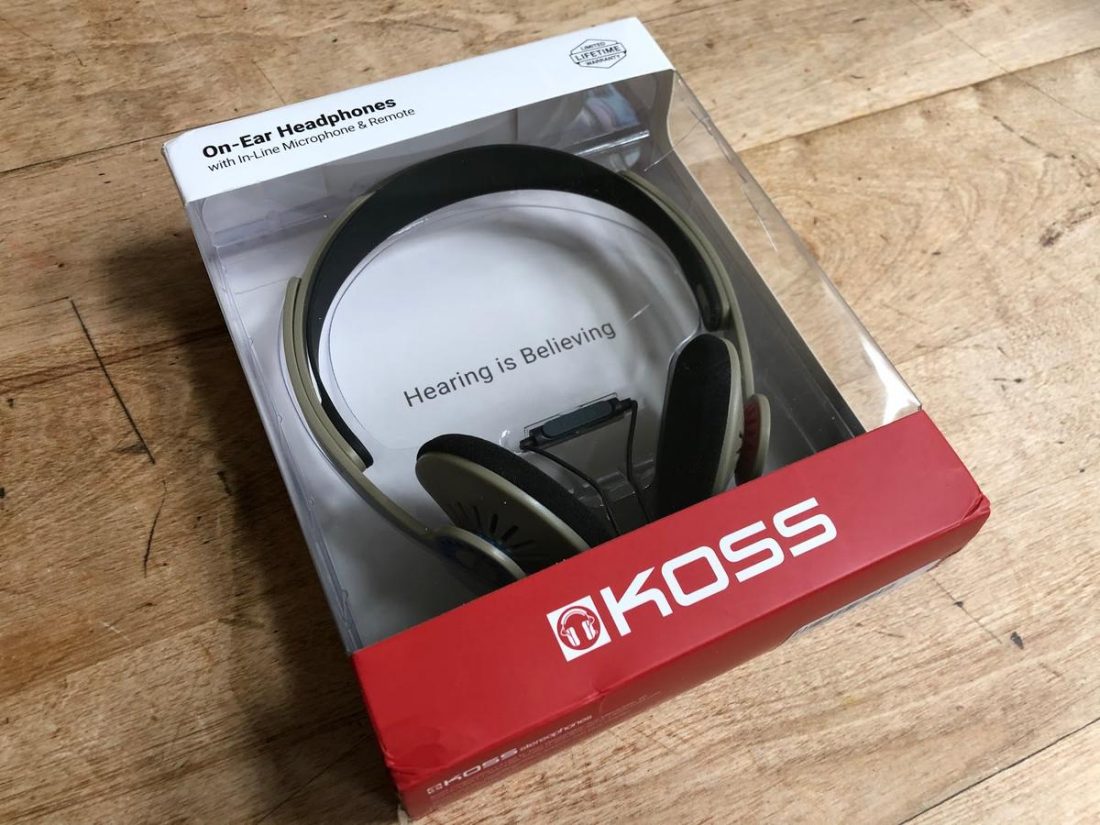
Packaging
Unsurprisingly, we find the classic Koss red and white packaging with a large plastic front window and clear plastic insert. It’s attractive with traditional retail kind of looks, although it would be nice to see a more sustainable approach to packaging going forward.
The box’s back shows a picture of a dude (with thick black eyeglass frames, backward hat, and button-up shirt) that I SO don’t relate to (but perhaps that’s because I’m grumpy and old) and a few feature pictures of the KPH30i.
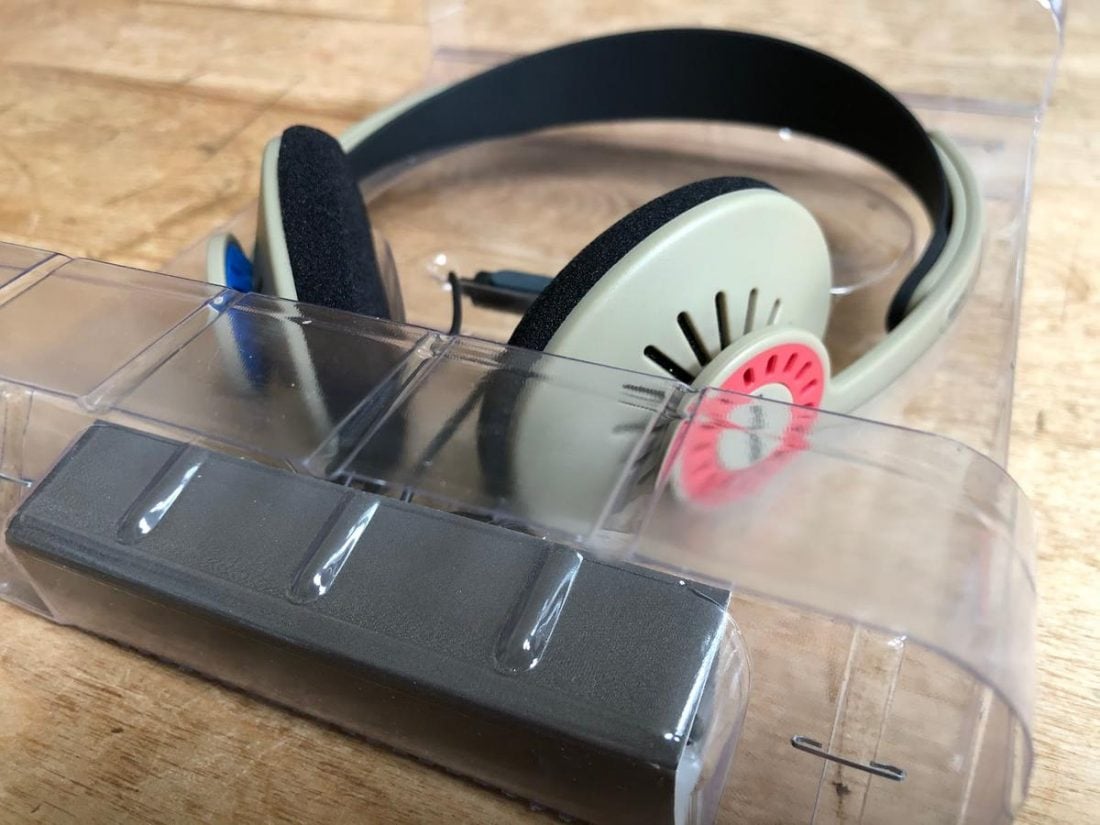
In the box
- KPH30i
- Koss Limited Lifetime Warranty sheet
Cable
The non-replaceable cable differs from the Porta Pro’s thin dual-wire and angled plug design. The KPH30i cable is round and thicker, with a basic in-line microphone and remote and a straight 3.5mm TRRS plug with a spring strain relief. It feels a bit more modern and robust than the Porta Pro cable.
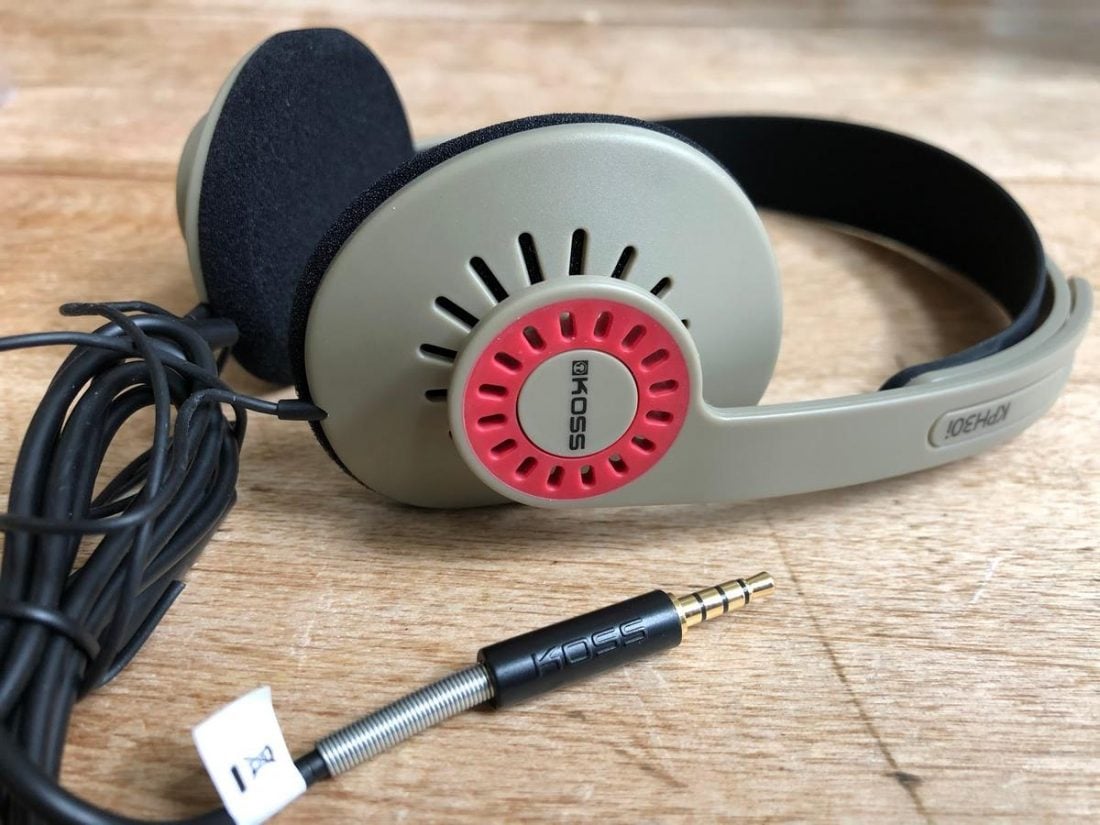
Design
Do you like the Koss retro-inspired designs or not? Because that is likely how you will view the KPH30i. Being hopelessly nostalgic for the sunnier days of my misspent youth, I purchased the Rhythm Beige colorway. A color palette that the pre-black computer accessory revolution certainly inspired.
The KPH30i do have attractive red and blue rings that unmistakably signify the right and left sides. The rings serve a dual function as the ear cup attachment points. They are made of rubber and automatically flex to fit and properly position the KPH30i on the ears.
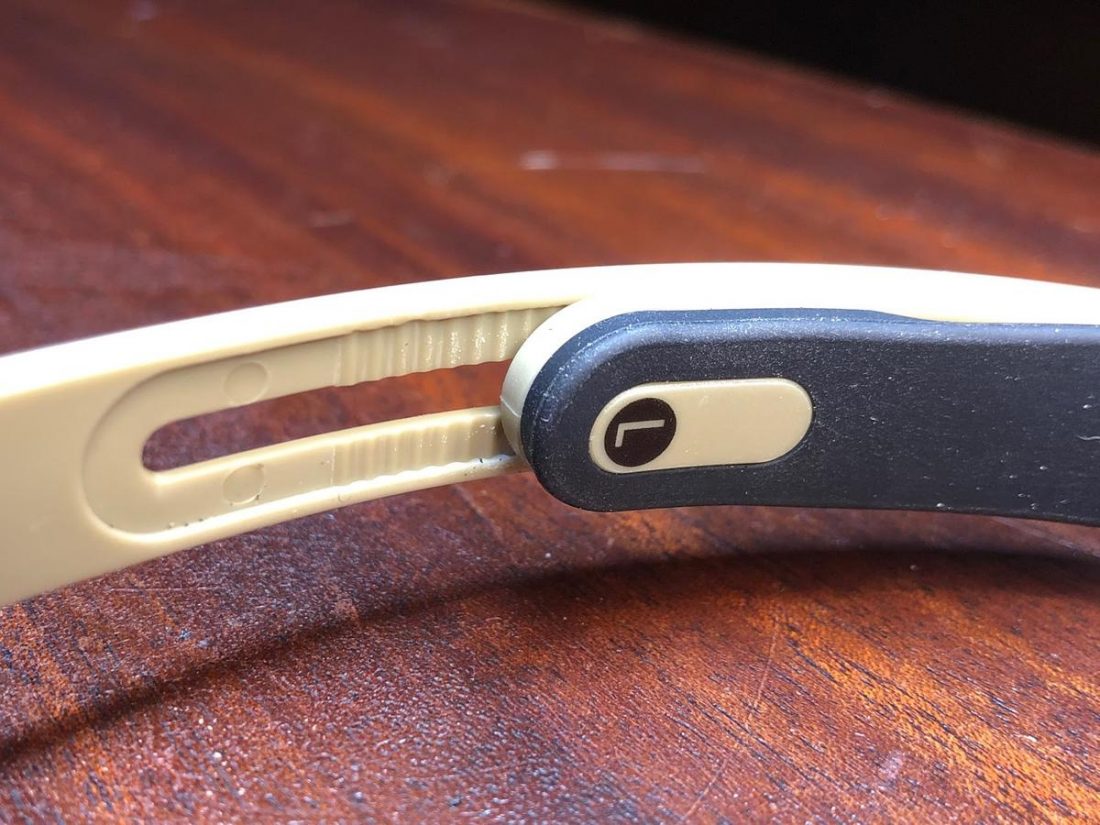
The KPH30i are constructed entirely of plastic (with a silicone head strap) and are clipped together without a screw in sight. The benefit is light weight and comfort. The drawback is that the KPH30i are far more fragile than the Porta Pro.
There are many reports of broken headbands where the sliders attach on the sides. Adding to this, the KPH30i do not fold and have no protective case, so I can see where throwing these in a full backpack would spell disaster.
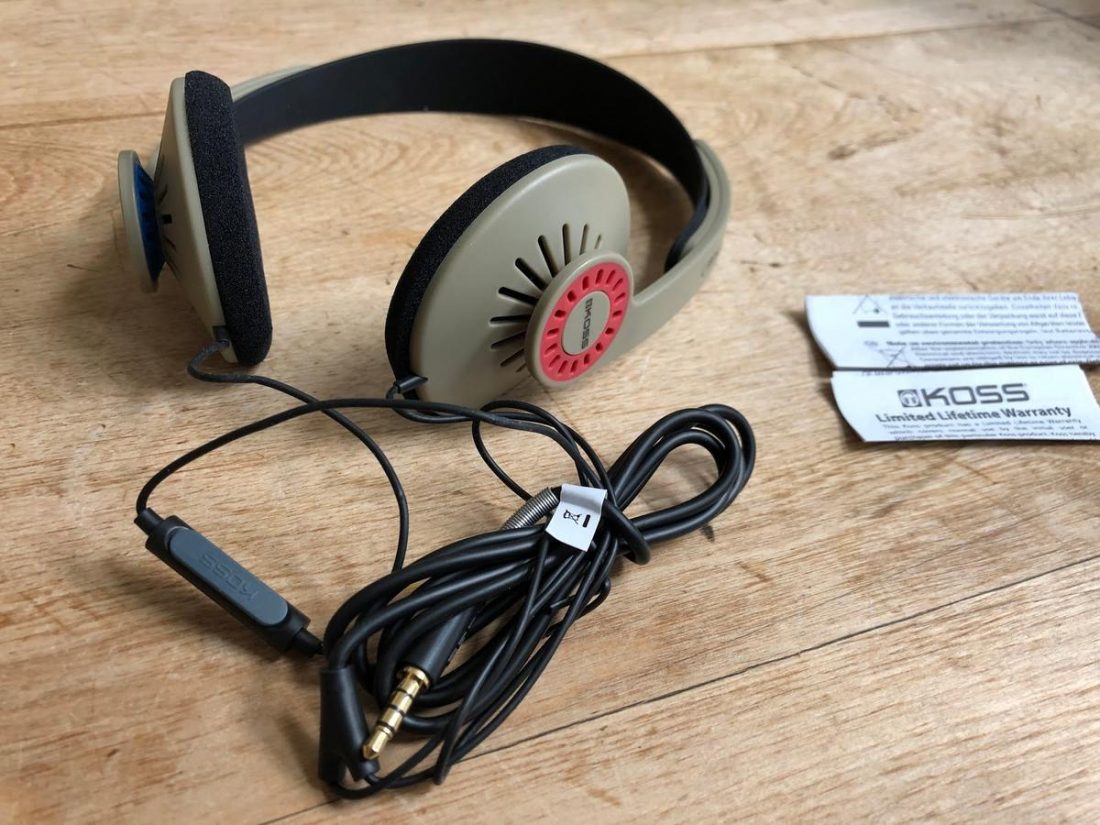
Like their brethren, the KPH30i are an on-ear, open-back design. They function great for portable use, as long as you don’t mind everyone else hearing what you are listening to and you hearing all outside noises. There are plenty of times where I appreciate a little more awareness when out and about, so these fit the bill nicely.
My only comfort complaint is with the thin and somewhat scratchy foam pads that are standard issue on the entry-level Koss headphones. As always, my strong recommendation is to invest in the marvelous Yaxi Pads (which, with admittedly more effort than on other models, can be fitted to the KPH30i).
Internals
Without repeating myself too much, the 35 mm, 60 Ohm driver is what makes this range of headphones so special. According to Koss, the “computer-optimized neodymium, iron, and boron rare-earth magnet structures deliver amazing clarity at any volume” and the “oxygen-free copper voice coils improve signal transmission and conduction for cleaner, clearer sound.”
And I’m not going to argue with them. This driver has been a budget audiophile favorite for almost 40 years.
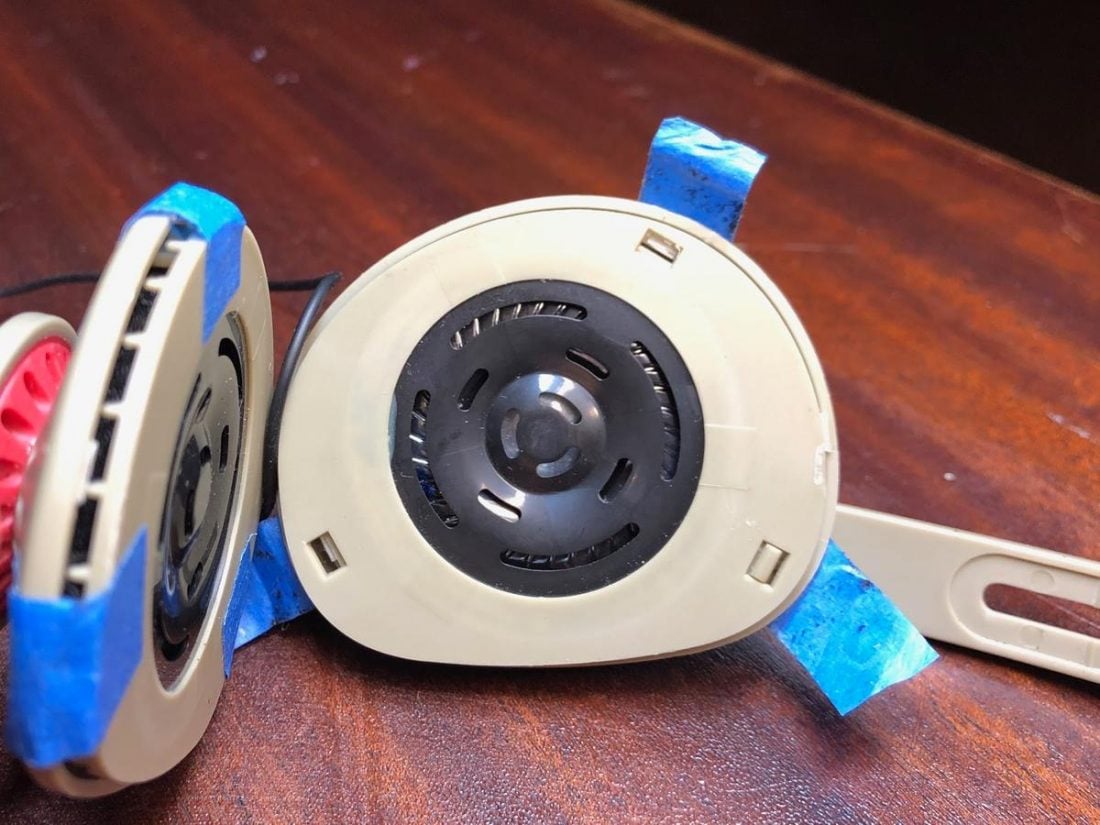
The KPH30i use the same non-coated version of the driver shared by the Porta Pro amongst others.
KPH30i Sound
Again, no surprises here. The sound quality of the KPH30i punches way above its weight class. They more than hold their own in the budget Koss lineup and absolutely deserve distinction from their peers.
What’s most remarkable is how little they get wrong.
Koss lists the first Key Feature of the KPH30i as “spacious sound & deep bass.” While “deep” may be debatable, this is a reasonably accurate depiction of what you can expect. The untreated Koss driver typically delivers a low-end focus, and the KPH30i are no exception. The very depths of the sub-bass aren’t really reproduced, but overall the bass region is articulate and conveys solidity and weight.
A feeling of spaciousness is created, especially for a headphone in this size and price bracket. The KPH30i avoid being an entirely in-your-head listening experience, and the overall sound is more extensive than expected. These are fun and engaging headphones with an open and expansive sound.
Of course, all isn’t perfect. The detail is pretty average, and they can sound a bit grainy depending on music choice and source. Additionally, I’d struggle to say that the KPH30i are resolving. Instead, they deliver a smooth and comfortable flavour to the music that is more enjoyable than many headphones priced far higher.
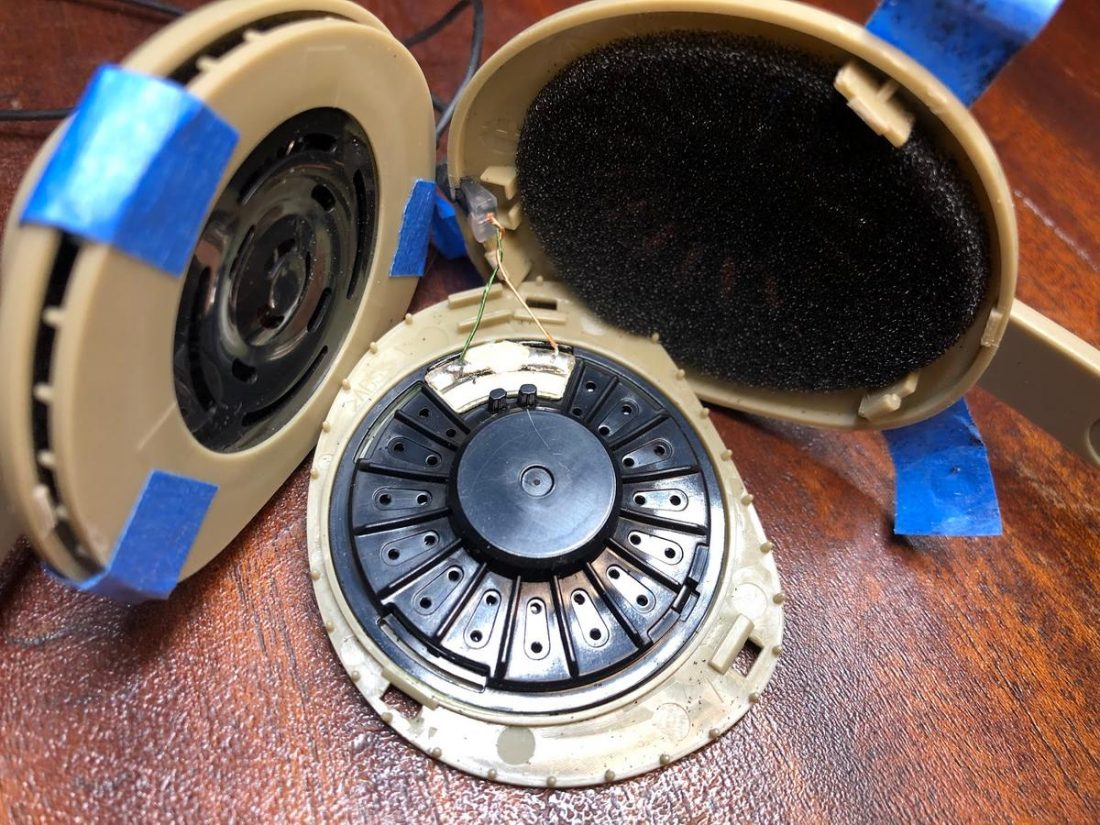
Like the other Koss headphones sharing the 60 Ohm (impedance), 101 dB (sensitivity) driver, the KPH30i can be driven reasonably easily by most portable devices. More powerful amplification can open them up a bit, but don’t expect miracles if you plug these headphones into a source costing 20 times more. The overall sound signature stays reasonably consistent regardless of what is driving them, but a little more oomph doesn’t hurt.
Bass
Bass is a bit of a quality-over-quantity scenario, with limited sub-sonics, and the KPH30i have a leaner sound than the Porta Pro. Still, the mid-bass is nicely present and adds fullness to the overall experience. Things remain well in control, and punch is limited enough to ensure no bloat or undue thickness.
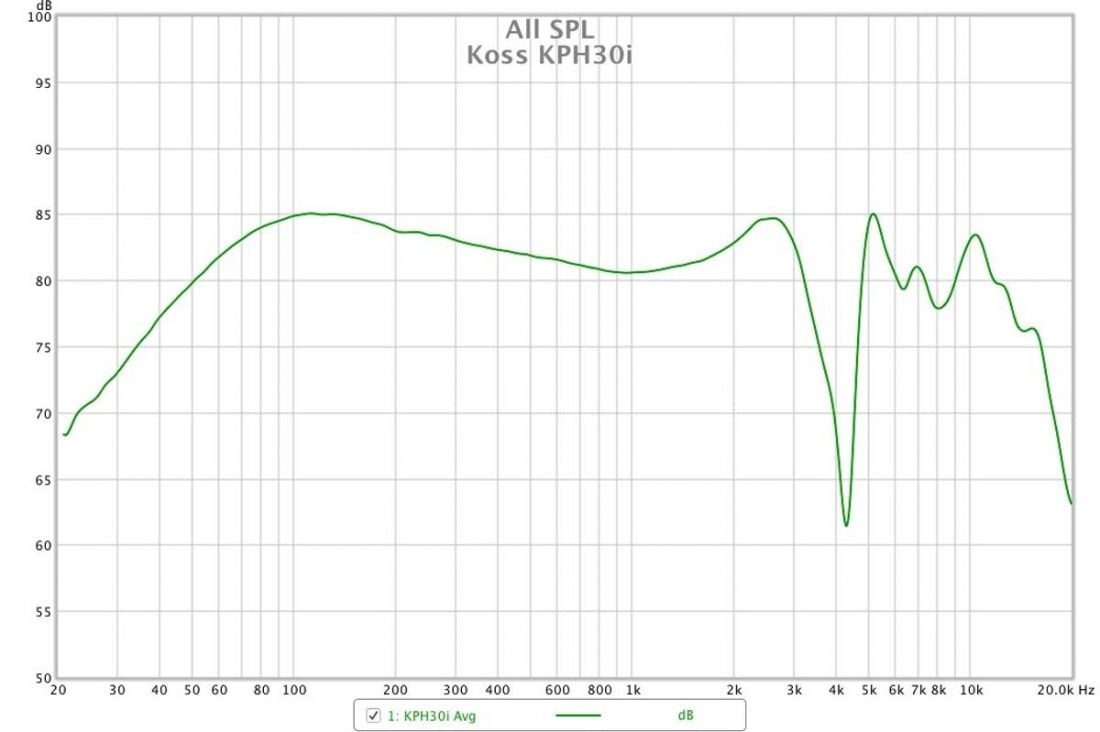
Midrange
While the midrange is a step back from the bass prominence, the midrange quality is the standout of the show. Vocal presence is impressive, avoiding any sort of harshness or hollowness. Instruments sound natural and well defined, and the dynamics are remarkable for a pair of headphones (dare I say it again) at this price.
Like me, if you are also a user of headphones for audiobooks as well as music, comfort and vocal clarity reign supreme when picking the proper tool for the job. And for these reasons, I love the KPH30i for audiobook listening.
Treble
The high-frequency reproduction is resolving enough to provide a decent feeling of detail, and the KPH30i are reasonably articulate. They don’t extend to the top-most highs, and the treble remains polite and non fatiguing. This sound profile works great for long listening sessions (especially with audiobooks).
Overall, the treble is competent,and serves as a smooth, laid-back counterpoint to the more dominant low-end.
Comparisons
| Headphone | Sound Quality | Bluetooth | Comfort | Build Quality | Value |
|---|---|---|---|---|---|
| KSC35 Wireless Ear Clips | 3 | 2 | 3 | 3 | 3 |
| KSC75 Ear Clips | 4 | 4 | 3 | 2 | |
| Porta Pro Wireless | 2 | 1 | 1 | 1 | 4 |
| KPH30i | 1 | 2 | 2 | 1 |
The chart above shows my relative rankings per category. 1 is highest and 4 is lowest. These ratings are only in reference to each other.
What is obvious from the chart above is that I rate the Porta Pro (wired and wireless versions) and the KPH30i above the KSC35 and KSC75 in basically all categories. Full disclosure, I’ve owned the Porta Pros for decades and love them. There are currently 4 pairs of them kicking around my home, and my wife has permanently adopted the wireless Porta Pros.
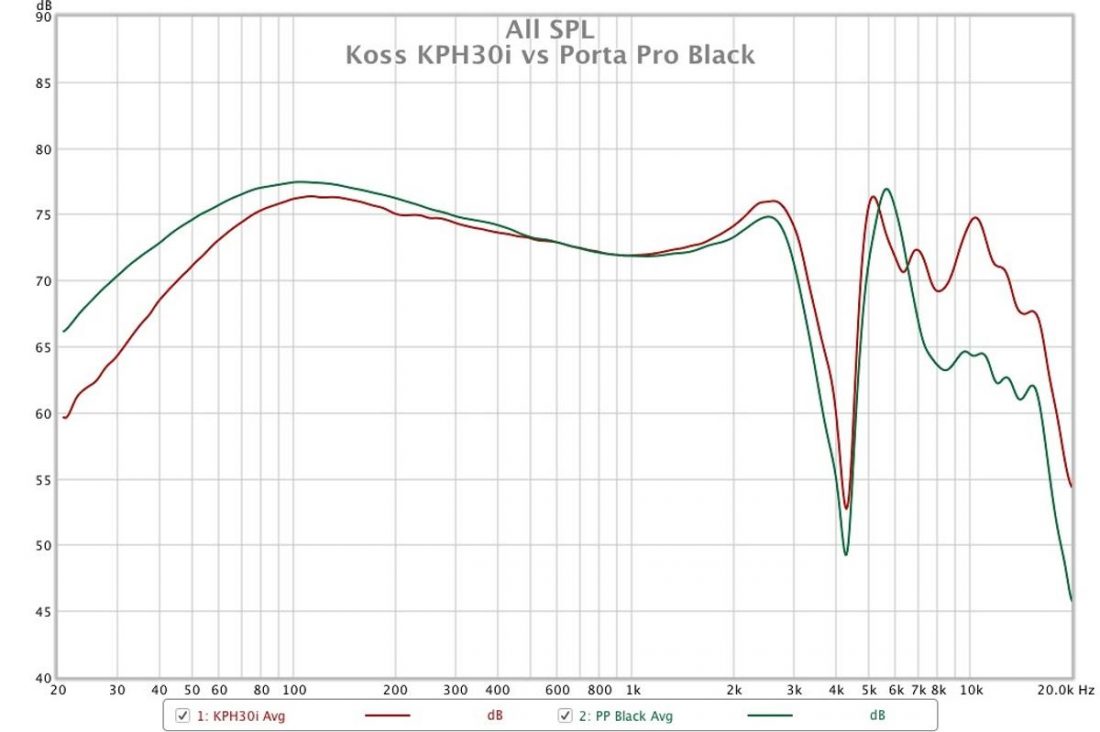
Compared to the Porta Pro, the KPH30i hold their own sonically. Where they fall behind is in build quality, with the Porta Pro proving to be the much more robust of the two. Many will find the KPH30i headband to be more comfortable, and the plastic and silicon band avoids pulling out hairs when adjusting.
While similarly voiced, the Porta Pro are the deeper and more bass-heavy option, with the KHP30i sounding a bit more balanced and even. This comes somewhat at the expense of fun, and I find the Porta Pro more exciting to listen to. The limited treble extension and smooth reproduction is surprisingly fairly similar sounding between the two, regardless of the differences in measurements.
Where to Buy
Conclusion
Although I don’t think the KHP30i are poised to supplant the Porta Pro, others may disagree. While retro-styled, the KPH30i are less distinctively and divisively styled than the 1984 designed Porta Pros. The cable and comfort are (perhaps) an upgrade. The KPH30i sound almost as good to my ears, and they are significantly less expensive.
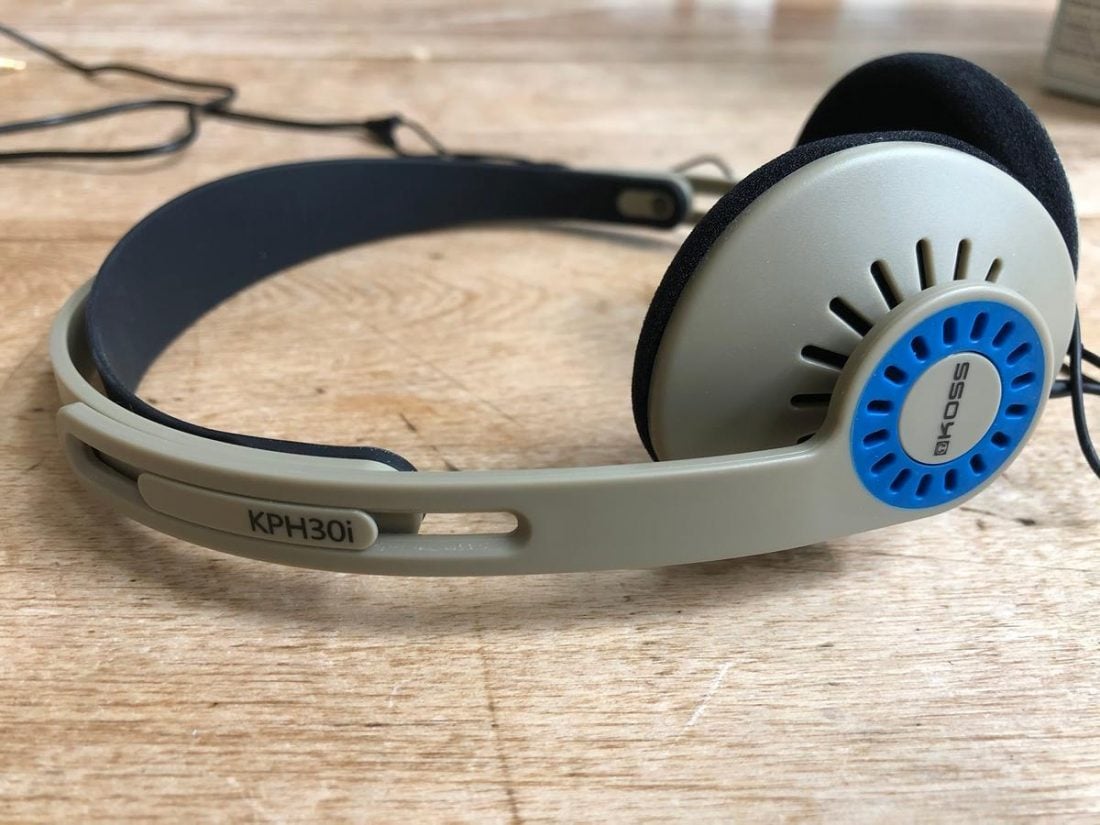
As with all the headphones sharing this venerable driver, the KPH30i offer far more than they cost.
Have a few extra shekels lying around and are curious how good cheap headphones can sound? Go buy the KPH30i. That’s the highest praise I can bestow.
